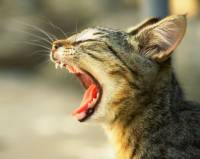
Many cats suffer holes in the teeth where the teeth meet the gums. These neck lesions, or FORLS, are intensely painful.
Cats with bad mouths show less interest in food. Some approach the food bowl eagerly but then pain overcomes hunger and they leave most of the food. They chew cautiously, drop food from the mouth, or swallow with difficulty. Dribbling, blood-tinged saliva, and bad breath are common.
Reluctance to eat leads to weight loss.
Tartar builds on the holes and rubs the inside of the cheek causing further pain. Severely affected cats paw their mouths or shake their heads.
The only effective treatment is extraction of the affected teeth under general anaesthesia.
Most people comment that their cat is much happier and more relaxed afterward. The short-lived pain of extraction is much less severe than the chronic and intense pain of the tooth neck lesions. We can prevent the pain of extraction but not the pain of neck lesions.
The cause of neck lesions is unknown. However, good dental health and a healthy diet help preserve teeth as long as possible. Regular veterinary checks reveal and treat neck lesions early.
Chunks of meat and small bones such as gravy beef, rabbit or chicken carcasses, kangaroo, chop bones or chicken thighs encourage chewing and prevent the build-up of plaque and tartar. Greenies are a palatable treat that clean the teeth as well. A bowlful of special dental foods such as Royal Canin dental or Hills t/d several times a week prevent dental disease.
Chewing meat and dental biscuits stimulates the production of saliva, which contains natural antibacterial substances, and scrapes plaque and tartar from the teeth.
Calicivirus vaccination helps prevent gingivitis.
We have given our cats Greenies before and they really like them. One of our cats drools a lot while she sleeps. Could this be related to her teeth or something else?
ReplyDeleteThanks!
Hi Miss G on P! Drooling most likely not related to teeth, more to relaxation, but PLEASE ask you vet to examine her teeth closely at her next check up. In some areas up to 80% of cats have these nasty neck lesions.
ReplyDeleteThanks so much for this post aswell as a wonderful appointment with Jacob and verbal information given to us today :)
ReplyDelete